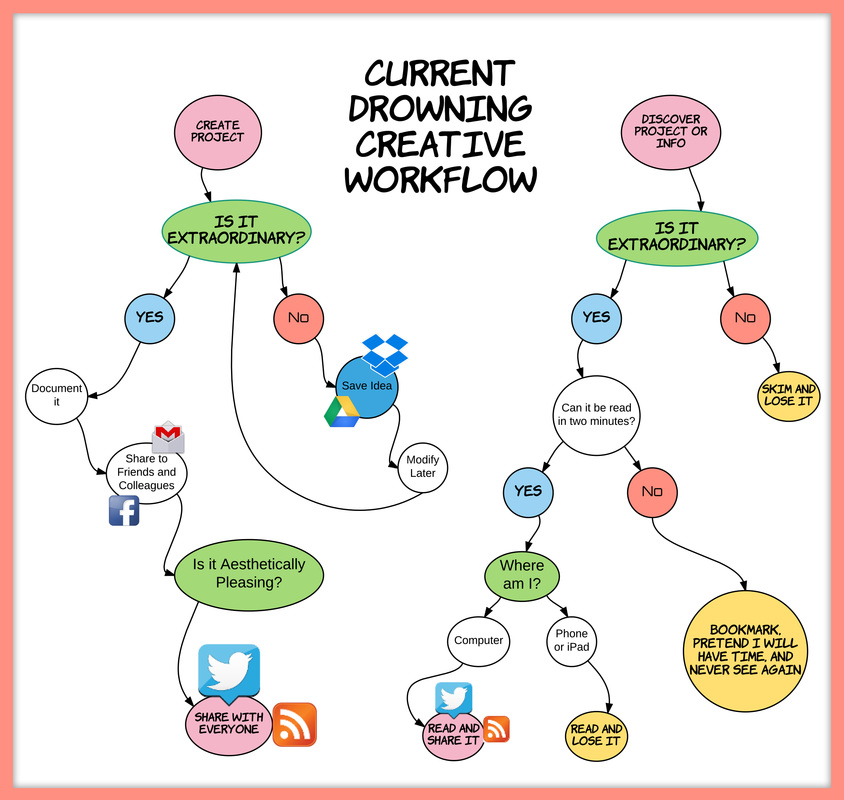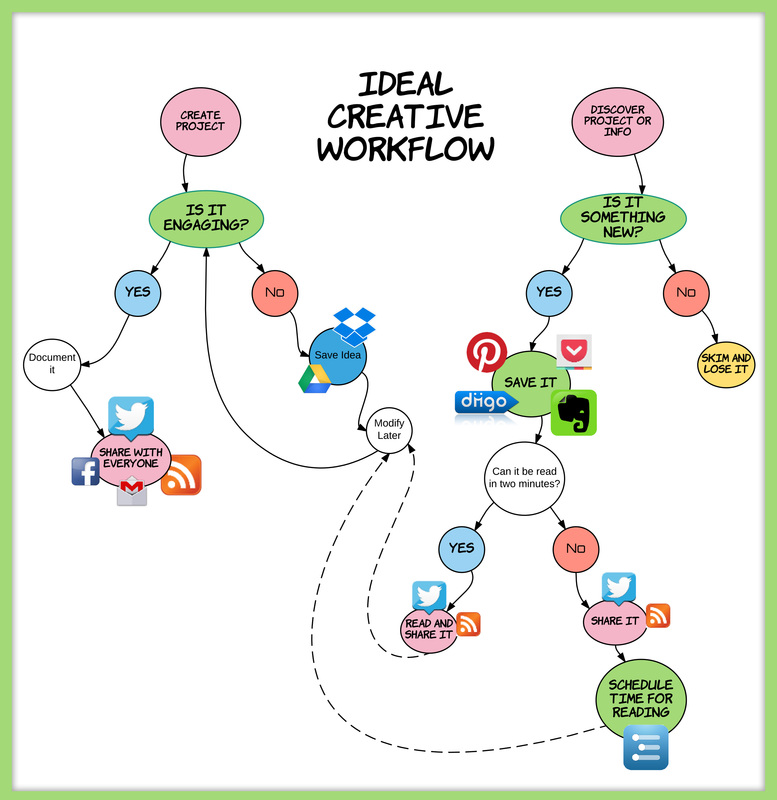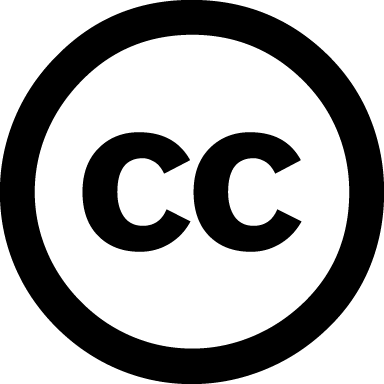After checking out Dean Shareski's video, Sharing - a Moral Imperative, I began to understand the core importance of sharing our work as educators a little better. Small things, such as lesson plans and material we use to help students understand a certain subject, can be extremely helpful to other teachers. I loved the math video series by Dan Meyer (watch his Ted Ed here), and how he shared his video series through his blog. I liked his ideas so much, I am now following him on Twitter... which means I now have one more awesome resource which I won't have time to read.
Looking at my own current workflow as an educator (below), I find that I have not yet found my footing, or my groove. Things have been happening very fast, and there is so much -- SO much I want to read and learn -- that it frustrates me to no end when I see days and weeks and months going by, and still not being able to organize the little time I have and actually use these resources.
Due to my lack of time, health and energy, I find that my line of judgment regarding resources -- both made by me, or other people -- is that they must be extraordinary in order to propel a response from me. That's a really tall order, and really bad in the long run.
If I create a project, I look at the resources, and if it is not extraordinary, I don't waste the little time I have with cataloguing and documenting the process. I save the idea, and take a few pictures, and keep it on my Dropbox for a day in the future when I have the time to revisit it and spice it up. Worse, when I make something that is extraordinary, and document it and save it, I only share it with other educators (through Twitter or Facebook) if it looks good enough, based on my own idea of what is aesthetically pleasing or not. In other words, I am a visual snob with my own things, kicking my poor little projects under the rug when they are not perfectly polished.
If I discover something online, or find a good link with information, I only really read it if it can be done in a couple of minutes; otherwise, I find myself saving the bookmark for later, when I know perfectly well that I don't ever look at them afterwards. I guess hope springs eternal.
I think the most frustrating is when I find a good tool to use, that would possibly save me time and help me become more organized... and then I just save the link on a folder in Dropbox and never see it again. I want to be so much better than this!
Looking at my own current workflow as an educator (below), I find that I have not yet found my footing, or my groove. Things have been happening very fast, and there is so much -- SO much I want to read and learn -- that it frustrates me to no end when I see days and weeks and months going by, and still not being able to organize the little time I have and actually use these resources.
Due to my lack of time, health and energy, I find that my line of judgment regarding resources -- both made by me, or other people -- is that they must be extraordinary in order to propel a response from me. That's a really tall order, and really bad in the long run.
If I create a project, I look at the resources, and if it is not extraordinary, I don't waste the little time I have with cataloguing and documenting the process. I save the idea, and take a few pictures, and keep it on my Dropbox for a day in the future when I have the time to revisit it and spice it up. Worse, when I make something that is extraordinary, and document it and save it, I only share it with other educators (through Twitter or Facebook) if it looks good enough, based on my own idea of what is aesthetically pleasing or not. In other words, I am a visual snob with my own things, kicking my poor little projects under the rug when they are not perfectly polished.
If I discover something online, or find a good link with information, I only really read it if it can be done in a couple of minutes; otherwise, I find myself saving the bookmark for later, when I know perfectly well that I don't ever look at them afterwards. I guess hope springs eternal.
I think the most frustrating is when I find a good tool to use, that would possibly save me time and help me become more organized... and then I just save the link on a folder in Dropbox and never see it again. I want to be so much better than this!
Thinking of what a perfect workflow groove would look like for me, I came up with the simplified chart below. Instead of considering if something is extraordinary or not when I create a project, I analyze if it engaged students in some way, and if so, then ideally everything that gets documented is then shared. Also, if something is not engaging, then I would look online for ideas, and if I found something that I could merge with my original project, I would use this to instruct my practice and change the project into something better.
Also, when it comes to info or projects I discover online, I would like to save it first and foremost. I checked out some tools that can be used for this purpose, such as Diigo, Pocket, Evernotes and Pinterest -- I haven't used any of these properly, not even Pinterest. Getting used to these tools would make a huge difference for me. Having these available on my phone and iPad also would help me save anything that is valuable for later use (which I currently don't do).
Also, when it comes to info or projects I discover online, I would like to save it first and foremost. I checked out some tools that can be used for this purpose, such as Diigo, Pocket, Evernotes and Pinterest -- I haven't used any of these properly, not even Pinterest. Getting used to these tools would make a huge difference for me. Having these available on my phone and iPad also would help me save anything that is valuable for later use (which I currently don't do).
It all comes down to organization and confidence. Organization will allow me to save projects and links I find, and actually be able to share them. Confidence (which hopefully will come with time -- this is just my first year teaching) will allow me to share everything I make without worrying if it looks pristine or perfect. If all of us educators share everything we make, then we are getting one step closer to making our knowledge a unified force, with good practices bringing change everywhere, and education in itself improving by leaps and bounds.
Sidenote:
I created these graphics using Lucid Chart; it is extremely intuitive and easy to use, with features including docked arrows that move organically as you move your bubbles. It comes with a 7-day free trial. After the 7-day trial, the basic price is $4.95 monthly, which would be great if all I did was use charts, but not for something I would only use once in a while... sigh. After I finished my charts, my husband pointed out Gliffy, which is an older competitor to Lucid Chart. While the paid version is $3.99 a month, there is a free account option, and while it doesn't let you save, you can simply finish your chart and take a screen capture of it. I tried Gliffy out and found it harder than Lucid Chart, but it is still a considerably free option.
Still fussing over Lucid Chart, I did a search on Google for Lucid Chart Education, and found a link which allows for teachers to request a free upgrade to their account. This is very exciting! I changed my email to my school email and did my request... hopefully this will be upgraded soon.
Sidenote:
I created these graphics using Lucid Chart; it is extremely intuitive and easy to use, with features including docked arrows that move organically as you move your bubbles. It comes with a 7-day free trial. After the 7-day trial, the basic price is $4.95 monthly, which would be great if all I did was use charts, but not for something I would only use once in a while... sigh. After I finished my charts, my husband pointed out Gliffy, which is an older competitor to Lucid Chart. While the paid version is $3.99 a month, there is a free account option, and while it doesn't let you save, you can simply finish your chart and take a screen capture of it. I tried Gliffy out and found it harder than Lucid Chart, but it is still a considerably free option.
Still fussing over Lucid Chart, I did a search on Google for Lucid Chart Education, and found a link which allows for teachers to request a free upgrade to their account. This is very exciting! I changed my email to my school email and did my request... hopefully this will be upgraded soon.


 RSS Feed
RSS Feed



